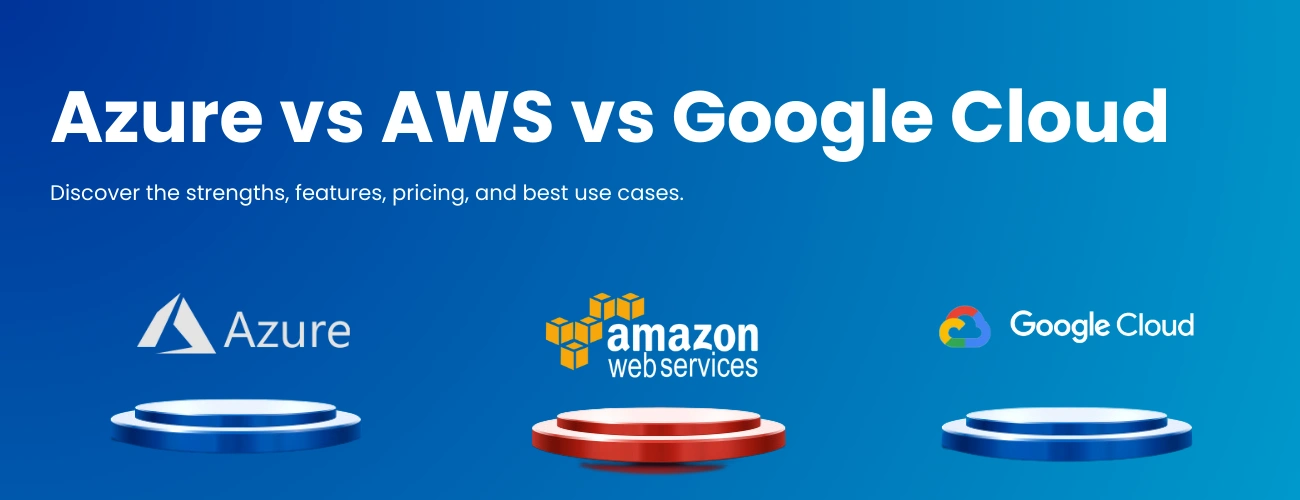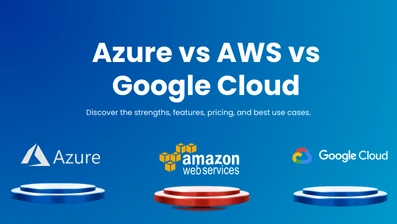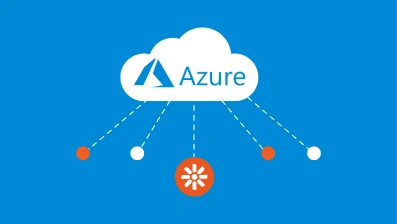Choosing the right cloud platform is a critical decision for any business looking to leverage the power of cloud computing.
With leading providers like Amazon Web Services (AWS) , Microsoft Azure, and Google Cloud Platform (GCP) , each offering unique features and benefits, it’s essential to understand what each platform brings to the table.
In this guide, we’ll compare AWS vs Azure vs Google Cloud, helping you make an informed decision based on your specific needs, budget, and business goals.
Discover how these top cloud platforms stack up in terms of services, pricing, security, and more.
What is AWS?
Amazon Web Services (AWS) is a comprehensive and widely adopted cloud platform offered by Amazon. Launched in 2006, AWS provides a vast array of cloud computing services, including computing power, storage options, and networking capabilities, among many others. It is designed to enable businesses to scale and grow while reducing the costs and complexities associated with managing on-premises infrastructure.
AWS development is known for its flexibility, extensive service offerings, and robust security features, making it a popular choice for companies of all sizes and across various industries.
Top Features
- Extensive Service Offerings: AWS offers over 200 fully featured services, including computing, storage, databases, analytics, machine learning, and IoT. This extensive range allows businesses to find solutions tailored to their specific needs.
- Scalability and Flexibility: AWS enables businesses to scale their applications up or down based on demand, ensuring optimal performance and cost efficiency. Services like Amazon EC2 (Elastic Compute Cloud) and AWS Lambda provide flexible computing power.
- Robust Security: AWS provides comprehensive security features, including encryption, identity and access management, and compliance certifications, ensuring data protection and regulatory compliance.
- Global Infrastructure: AWS operates in numerous geographic regions and availability zones, allowing businesses to deploy applications closer to their users for lower latency and better user experience.
Pricing
AWS uses a pay-as-you-go pricing model, meaning businesses only pay for the services they use. This flexible pricing structure helps manage costs effectively. Additionally, AWS offers a free tier for new customers, providing access to many services at no cost for a limited time. For businesses needing predictable pricing, AWS provides options for reserved instances and savings plans, offering significant discounts for long-term commitments. The aws azure google price comparison shows that AWS can be cost-effective depending on the specific services and usage patterns.
Best Suited For
AWS is best suited for:
- Startups and SMEs: Looking for cost-effective and scalable cloud solutions.
- Large Enterprises: Requiring extensive service offerings, robust security, and global reach.
- Developers and IT Teams: Needing flexible tools for building and managing applications.
- E-commerce Businesses: Leveraging AWS's robust infrastructure for high availability and performance.
- Data-Intensive Applications: Such as big data analytics, machine learning, and IoT, benefiting from AWS's advanced capabilities and extensive service portfolio.
By understanding the capabilities and benefits of AWS, businesses can make informed decisions about leveraging this powerful cloud platform to meet their digital and operational needs.
What is Google Cloud?
Google Cloud Platform (GCP) is a suite of cloud computing services offered by Google.
Launched in 2008, GCP provides a wide range of cloud solutions, including computing, storage, data analytics, machine learning, and networking.
Google Cloud is known for its advanced data analytics and machine learning capabilities, leveraging Google's expertise in big data and artificial intelligence.
It offers a robust and scalable infrastructure that supports businesses of all sizes, enabling them to innovate and grow efficiently.
GCP is designed to help organizations build, deploy, and operate applications and services on a global scale.
Top Features
- Advanced Data Analytics and AI: GCP provides powerful tools for data analytics and machine learning, such as BigQuery for data warehousing and TensorFlow for AI development. These tools enable businesses to gain insights from their data and build intelligent applications.
- Scalability and Performance: Google Cloud offers scalable computing resources with services like Google Compute Engine and Google Kubernetes Engine. These services ensure high performance and reliability for applications of any size.
- Global Network: GCP leverages Google's extensive global network infrastructure, providing low-latency access and high availability. This global reach allows businesses to serve customers around the world efficiently.
- Robust Security: Google Cloud includes strong security features, such as encryption, identity and access management, and compliance with various industry standards. These features ensure data protection and regulatory compliance.
Pricing
Google Cloud uses a pay-as-you-go pricing model, allowing businesses to pay only for the resources they use. GCP offers a free tier with limited access to several services, enabling new customers to explore and test the platform at no cost. For businesses seeking predictable costs, Google Cloud provides committed use contracts that offer significant discounts for long-term usage. The aws azure google price comparison indicates that GCP's pricing is competitive, especially for data analytics and machine learning workloads.
Best Suited For
Google Cloud is best suited for:
- Data-Driven Businesses: Utilizing advanced data analytics and machine learning tools to derive insights and build AI-driven applications.
- Startups and Developers: Leveraging scalable and flexible infrastructure to innovate and deploy applications quickly.
- Global Enterprises: Needing a robust and reliable global network to serve customers worldwide.
- Educational Institutions: Taking advantage of GCP's powerful tools for research and data analysis.
- Enterprises with Multi-Cloud Strategies: Integrating Google Cloud with other cloud platforms for a comprehensive cloud environment.
By leveraging the capabilities of Google Cloud, businesses can harness the power of data and innovation to drive growth and achieve their strategic objectives.
What is Azure?
Microsoft Azure is a comprehensive cloud computing platform provided by Microsoft, launched in 2010.
Azure development offers a wide range of services, including computing, storage, databases, networking, machine learning, and analytics, designed to help businesses build, deploy, and manage applications through Microsoft-managed data centers.
Azure supports various programming languages, frameworks, and tools, making it a flexible and versatile option for businesses of all sizes.
With its extensive global network of data centers, Azure ensures high availability and reliability for applications deployed on its platform.
Azure integrates seamlessly with Microsoft's suite of products, including Windows Server, SQL Server, and Microsoft 365, making it an attractive choice for businesses already using Microsoft technologies.
Top Features
- Comprehensive Service Portfolio: Azure provides over 200 services, including Azure Virtual Machines, Azure Kubernetes Service (AKS), Azure SQL Database, and Azure Machine Learning, catering to a wide range of business needs.
- Hybrid Cloud Capabilities: Azure's hybrid cloud solutions enable businesses to extend their on-premises infrastructure to the cloud, ensuring seamless integration and management across both environments.
- Security and Compliance: Azure offers robust security features, including advanced threat protection, encryption, and identity management, along with compliance with numerous industry standards and regulations, ensuring data security and compliance.
- Integration with Microsoft Products: Azure integrates seamlessly with popular Microsoft products like Windows Server, SQL Server, and Microsoft 365, providing a unified ecosystem for businesses already using these tools.
Pricing
Azure uses a pay-as-you-go pricing model, allowing businesses to pay only for the resources they use. This flexible pricing structure helps manage costs effectively. Azure also offers various pricing options, such as reserved instances and spot pricing, to help businesses optimize their spending. The aws azure google price comparison indicates that Azure's pricing is competitive, particularly for businesses already invested in the Microsoft ecosystem. Additionally, Azure provides a free tier with limited access to several services, enabling new customers to explore and test the platform at no cost.
Best Suited For
Azure is best suited for:
- Enterprises: Requiring robust, scalable, and secure cloud solutions with seamless integration with existing Microsoft products.
- Developers and IT Teams: Needing flexible tools for building, deploying, and managing applications across a global network.
- Hybrid Cloud Deployments: Leveraging Azure's hybrid capabilities to integrate on-premises infrastructure with the cloud.
- Data-Intensive Applications: Such as big data analytics, AI, and machine learning, benefiting from Azure's advanced capabilities.
- Organizations with Compliance Needs: Ensuring data security and compliance with industry standards and regulations.
By leveraging the capabilities of Azure, businesses can build, deploy, and manage applications efficiently, ensuring scalability, security, and seamless integration with their existing Microsoft technologies.
Comparing Google Cloud vs AWS vs Azure
Choosing the right cloud platform can be a daunting task given the extensive features and services offered by the leading providers: Google Cloud Platform (GCP), Amazon Web Services (AWS), and Microsoft Azure. Here's a detailed comparison to help you make an informed decision.
| Criteria | Google Cloud (GCP) | Amazon Web Services (AWS) | Microsoft Azure |
|---|---|---|---|
| Service Offerings | Strong focus on data analytics, machine learning, and AI. Over 100 services. | Extensive range of over 200 services across various domains. | Comprehensive suite of over 200 services, strong integration with Microsoft products. |
| Global Reach | 29 regions and 88 zones worldwide. | 26 regions and 84 availability zones globally. | 60+ regions and 140+ availability zones, largest global footprint. |
| Pricing | Competitive pay-as-you-go pricing, committed use contracts for discounts. | Pay-as-you-go model, reserved instances for discounts. | Pay-as-you-go pricing, reserved instances, and spot pricing for cost savings. |
| Security | Advanced security features, strong emphasis on data protection and compliance. | Robust security measures, extensive compliance certifications. | Enterprise-grade security, comprehensive compliance portfolio, advanced threat protection. |
| Machine Learning & AI | Leading tools like TensorFlow, BigQuery for data analytics. | Extensive ML services like SageMaker, comprehensive AI services. | Azure Machine Learning, strong AI capabilities integrated with other Microsoft products. |
| Hybrid Cloud | Supports hybrid cloud but not as robust as Azure. | Supports hybrid cloud with services like Outposts. | Best-in-class hybrid cloud capabilities with Azure Arc and Azure Stack. |
| DevOps & CI/CD | Strong DevOps tools like Cloud Build, integrated CI/CD pipelines. | Wide range of DevOps services, including CodePipeline, CodeBuild, and CodeDeploy. | Integrated DevOps services, including Azure DevOps, GitHub integration. |
| Ecosystem Integration | Strong integration with Google Workspace, open-source friendly. | Extensive ecosystem integration, supports a wide range of third-party tools. | Deep integration with Microsoft ecosystem, including Office 365, Dynamics 365, and Windows Server. |
| Customer Support | 24/7 customer support, various support plans available. | Comprehensive support plans, extensive documentation and community forums. | Extensive support options, including Premier Support, strong enterprise support channels. |
| Notable Customers | Spotify, HSBC, Snapchat, Twitter. | Netflix, Airbnb, NASA, Samsung. | Adobe, Toyota, HSBC, Johnson Controls. |
Service Offerings:
AWS boasts the most extensive range of services, offering over 200 fully featured services across various domains including computing, storage, databases, and machine learning. Azure and GCP also provide comprehensive service portfolios but with different strengths. Google Cloud excels in data analytics and machine learning, while Azure is known for its seamless integration with Microsoft products and best-in-class hybrid cloud capabilities.Global Reach:
Azure leads in global reach with over 60 regions and 140+ availability zones, providing the largest global footprint among the three. AWS follows closely with 26 regions and 84 availability zones, while Google Cloud operates in 29 regions and 88 zones. The extensive global network of these providers ensures low latency and high availability for applications deployed on their platforms.Pricing:
All three providers offer flexible pay-as-you-go pricing models, with options for reserved instances and long-term commitments to help manage costs. AWS and Azure provide various discount models such as reserved instances and spot pricing. Google Cloud offers competitive pricing and committed use contracts for cost savings. Comparing prices across AWS, Azure, and Google depends on specific service usage and commitment plans.Security:
Security is a top priority for all three platforms. AWS and Azure provide robust security measures, extensive compliance certifications, and advanced threat protection. Google Cloud is known for its strong emphasis on data protection and compliance, offering advanced security features to ensure data safety.Machine Learning & AI:
Google Cloud leads in machine learning and AI with tools like TensorFlow and BigQuery. AWS offers a comprehensive suite of ML services such as SageMaker, while Azure provides strong AI capabilities integrated with other Microsoft products, making it a powerful choice for enterprises looking to leverage AI.Hybrid Cloud:
Azure stands out with its best-in-class hybrid cloud capabilities, offering services like Azure Arc and Azure Stack. AWS supports hybrid cloud with AWS Outposts, and Google Cloud also offers hybrid solutions but is not as robust as Azure in this domain.DevOps & CI/CD:
All three providers offer strong DevOps and CI/CD tools. Google Cloud provides tools like Cloud Build for integrated CI/CD pipelines. AWS offers a wide range of DevOps services including CodePipeline, CodeBuild, and CodeDeploy. Azure integrates well with Azure DevOps and GitHub, providing a comprehensive DevOps environment.Ecosystem Integration:
Azure has deep integration with the Microsoft ecosystem, making it ideal for businesses already using Microsoft products. AWS supports a wide range of third-party tools and has an extensive ecosystem. Google Cloud integrates well with Google Workspace and is open-source friendly, making it a strong choice for developers.Customer Support:
All three providers offer comprehensive customer support options, including 24/7 support and various support plans. AWS and Azure provide extensive documentation and community forums, while Google Cloud offers various support plans and strong community support.Use Cases and Real-World Examples:
Each cloud platform excels in different use cases. AWS is widely used for web hosting, big data processing, and enterprise applications, with customers like Netflix and Airbnb. Azure is preferred for businesses deeply integrated with Microsoft products, such as Adobe and Johnson Controls, leveraging Azure’s hybrid cloud capabilities. Google Cloud is favored for data analytics and AI, with companies like Spotify and Snapchat utilizing its advanced machine learning tools.Performance and Reliability:
AWS offers a robust global infrastructure with high availability and low latency, ensuring reliable performance. Azure matches this with its extensive global footprint and strong integration with enterprise environments. Google Cloud leverages Google's vast network infrastructure, providing excellent performance and reliability, particularly for data-intensive applications. All three platforms guarantee high uptime and rapid response times, making them suitable for mission-critical applications.Support and Community:
All three providers offer comprehensive support options and active communities. AWS provides extensive documentation, community forums, and various support plans. Azure offers robust enterprise support, integrating well with Microsoft’s support ecosystem. Google Cloud has strong community support and detailed documentation, along with several support tiers. Each platform’s community forums and knowledge bases are invaluable resources for troubleshooting and learning.Migration and Integration:
AWS and Azure both provide robust tools for migrating existing applications to the cloud, including dedicated migration services and extensive documentation. Google Cloud also offers comprehensive migration tools and services, focusing on ease of integration with existing systems. Azure excels in hybrid cloud integration, making it ideal for businesses with on-premises infrastructure. AWS supports a wide range of integrations, and Google Cloud is known for its open-source compatibility.Compliance and Regulatory Considerations:
Compliance is critical for businesses in regulated industries. AWS has extensive compliance certifications, covering a wide range of standards globally. Azure also offers comprehensive compliance and regulatory support, particularly strong in government and financial services sectors. Google Cloud emphasizes data protection and compliance, meeting various international standards. All three platforms provide tools and services to help businesses maintain compliance with industry-specific regulations.
How To Choose The Right One For You
Selecting the right cloud platform for your business can be a challenging task, especially when choosing between AWS, Azure, and Google Cloud.
Each platform offers unique features and capabilities, so it's crucial to evaluate them based on your specific business needs and goals. Here are key factors to consider when deciding which platform is right for you:
A] Assess Your Business Needs
- Core Requirements
- Determine the core functionalities you need from a cloud provider. Are you looking for comprehensive computing and storage solutions, advanced data analytics and machine learning, or seamless integration with existing enterprise applications?
- AWS: Ideal for a wide range of services and flexibility across various domains.
Azure: Best for businesses deeply integrated with Microsoft products.
Google Cloud: Excellent for data-driven companies focusing on analytics and AI.
- Scalability and Performance
- Consider the scalability and performance requirements of your applications. How much traffic and data will your applications handle, and how critical is performance and uptime?
- AWS and Azure: Both offer extensive global networks ensuring high performance and scalability.
Google Cloud: Strong in low-latency access and high-performance computing.
B] Budget and Pricing
- Cost Management
- Evaluate the pricing models and cost management options provided by each platform. Compare pay-as-you-go, reserved instances, and discounts for long-term usage.
- AWS and Azure: Provide flexible pricing options including reserved instances and spot pricing.
Google Cloud: Competitive pricing with committed use contracts for cost savings.
- Free Tier and Trials
- Take advantage of free tiers and trial periods to test the platforms. Assess the cost-effectiveness based on your projected usage.
- AWS: Offers a comprehensive free tier for new customers.
Azure: Provides a generous free tier and credits for new users.
Google Cloud: Features a free tier with ample credits to explore services.
C] Security and Compliance
- Data Security
- Examine the security features and compliance certifications of each platform. Ensure they meet your industry’s regulatory requirements and provide robust security measures.
- AWS and Azure: Both offer extensive security features and compliance certifications.
Google Cloud: Strong focus on data protection and compliance.
D] Technical Capabilities and Support
- Integration and Ecosystem:
- Evaluate how well each platform integrates with your existing tools and applications. Consider the availability of APIs, SDKs, and third-party integrations.Consider the quality and availability of customer support, documentation, and training resources provided by each platform.
- Azure: Seamlessly integrates with Microsoft products and services.
AWS: Supports a wide range of third-party tools and services.
Google Cloud:Integrates well with Google Workspace and other open-source tools. - Customer Support and Resources:
- Assess the quality and availability of customer support, documentation, and training resources provided by each platform.
- AWS and Azure: Offer extensive documentation, community forums, and various support plans.
Google Cloud: Provides strong community support and various support plans.
E] Special Requirements
- Hybrid Cloud and Multi-Cloud Strategies:
- If your business requires a hybrid or multi-cloud strategy, consider the hybrid cloud capabilities and interoperability of each platform.
- Azure: Best-in-class hybrid cloud solutions with Azure Arc and Azure Stack.
AWS: Supports hybrid cloud with AWS Outposts.
Google Cloud: Offers hybrid solutions but not as robust as Azure.
- Industry-Specific Needs:
- Consider any industry-specific requirements or features that might influence your decision.
- Google Cloud: Strong in data analytics and AI, suitable for data-intensive industries.
AWS: Versatile and widely used across various industries.
Azure:Ideal for industries heavily using Microsoft software.
DotStark, Helping Innovators Innovate
As a cloud app development company, we specialize in helping businesses navigate the complexities of cloud adoption and optimization.
As experts in AWS, Azure, and Google Cloud, we provide tailored solutions that align with your strategic goals and technical requirements.
Whether you’re looking to migrate your infrastructure, optimize your cloud spending, or leverage advanced services like machine learning and data analytics, our team of certified cloud professionals is here to support you.
We offer comprehensive services, including cloud consulting, migration, management, and support, ensuring a smooth transition and maximizing the benefits of your cloud investment.
Conclusion
Choosing the right cloud platform—whether it's AWS, Azure, or Google Cloud—depends on a thorough understanding of your business needs, technical requirements, budget constraints, and future growth plans. By carefully evaluating these factors, you can select the platform that best aligns with your strategic goals and maximizes your return on investment.
Frequently Asked Questions
Google Cloud provides powerful tools for data analytics and machine learning, such as BigQuery and TensorFlow, making it an excellent choice for data-driven applications.
Yes, many businesses adopt a multi-cloud strategy to leverage the strengths of different platforms and avoid vendor lock-in.
All three platforms provide robust security features and compliance certifications. AWS and Azure offer extensive security measures, while Google Cloud emphasizes data protection and compliance.
AWS offers the most extensive range of services and global reach. Azure integrates seamlessly with Microsoft products, and Google Cloud excels in data analytics and machine learning.
All three providers offer comprehensive customer support plans, including 24/7 support, extensive documentation, and community forums.
Azure offers best-in-class hybrid cloud capabilities with services like Azure Arc and Azure Stack, allowing seamless integration with on-premises infrastructure.
AWS is ideal for a wide range of applications, including web hosting, big data processing, machine learning, and enterprise applications.
Cost-effectiveness depends on your specific needs and usage patterns. AWS, Azure, and Google Cloud all offer competitive pricing models with various discounts for long-term commitments.
Startups often choose based on specific needs. AWS and Google Cloud are popular for their extensive free tiers and developer-friendly tools, while Azure is great for startups already using Microsoft products.










 +91 9680599916
+91 9680599916
 vanshika@dotstark.com
vanshika@dotstark.com
